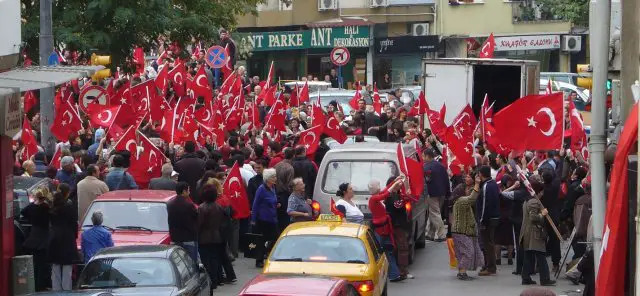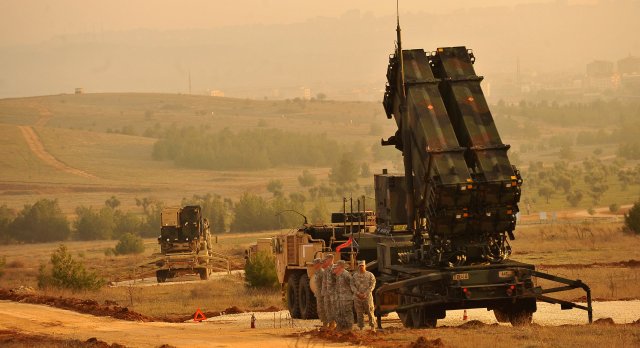- Army
- Conflicts in the world
- Israel - Iran conflict 2025
- Pakistan - India Conflict 2025
- Russia Ukraine War 2022
- Libya conflict day by day
- HAMAS - Israel War 2023
- Operation Serval in Mali French Army
- Sangaris operation Central African Republic
- Sangaris opération militaire République Centreafrique
- Ukraine - Russia conflict
- Syria conflict news
- Defence & Security Industry Technology
- Armies in the world
- Analysis Defense and Security Industry
- Conflicts in the world
- Navy
- Air
Turkish invasion of Syria should be to defeat the Kurdish militias 31802162
|
|
|||
|
Defence & Security News - Conflict in Syria
|
|||
|
|
|||
| Turkish invasion of Syria should be to defeat the Kurdish militias | |||
|
The objective of a Turkish invasion of Syria will be the defeat of the Kurdish militias controlling large swaths of the Syrian-Turkish border, rather than the seizure of Damascus, Gevorg Mirzayan, an expert with Expert Online, believes. Turkey is much apprehensive that the Kurds will not leave the areas they have seized, but will set up an autonomous district (if Bashar al-Assad wins the civil war and preserves the territorial integrity of Syria) or a de facto independent state there.
|
|||
|
|
|||
 A demonstration against the PKK in Kadıköy, İstanbul A demonstration against the PKK in Kadıköy, İstanbul |
|||
|
|
|||
|
Both outcomes are unacceptable to Ankara, because Syrian Kurdistan would become an ideal logistic base for the Turkish Kurds with the Kurdistan Workers’ Party fighting for autonomy as part of Turkey. However, the occupation of future Syrian Kurdistan by the Turkish forces would allow defeating the Kurdish militia and restoring control of the areas by local militants or radical Islamists, Gevorg Mirzayan opines.
Ankara presumes that its invasion of Syria will yield it such bonuses as a stronger position in the Geneva process, in the first place. Following the incident with the Russian Sukhoi Su-24M (NATO reporting name: Fencer) bomber, defeat of the pro-Turkish Turkoman groups in northern Latakia and considerable damage to Turkey’s image due to the exposure of its trade with the Russia-banned Islamic State (IS) terrorist group, Turkey actually is being ousted from the Syrian affairs, while the media (not only the Russian ones, in fact) are painting it as an accomplice to terrorists. The invasion of Syria and quick seizure of lands in the country’s north occupied now by the militants (Turkey bankrolls them and may well ask them to betray the local militant groups) are conceived to convince the whole world that Turkish authorities can fight terrorists much more effectively than the Russian-Iranian-Syrian coalition. Secondly, the invasion would add confidence to the militants throughout Syria and make it unnecessary for them to negotiate with al-Assad on reasonable terms. As a result, the peace process in Syria would be derailed, the Americans and Russians (and, possibly, the Iranians) would again split up and resume confrontation, while Ankara would strengthen its position both in the Middle East and in the Caucasus. The problem is that such an interesting and promising ploy with the invasion is fraught with huge risks for two reasons at the least. First, it is Russia’s response. Vladimir Putin has made it clear that the Kremlin is eager of visiting retribution on Turkey for the downed Su-24M. This is not only a matter of personal pride or insult. Russia needs a compensation for the downed bomber so it can turn this page as far as its diplomacy is concerned, because persistent demands that Turks apologize and the latter’s persistent refusals to do so do not contribute to Moscow’s prestige. However, the elimination of a Turkish military convoy invading Syria would be the ideal payback and a legal one, to boot, because Turkey as an aggressor invading a neighboring state would have no legal grounds to turn to its NATO allies for help. |
|||
|
|
|||
 Six batteries of NATO-backed missile defense systems have been set up in southeastern Turkey to protect against aerial attacks from war-torn Syria. Six batteries of NATO-backed missile defense systems have been set up in southeastern Turkey to protect against aerial attacks from war-torn Syria. |
|||
|
|
|||
|
Therefore, the Turks need a 100% guarantee that Russia will not deliver a strike. Possibly, there might be guarantees, if the Americans side with the Turks. The United States could threaten Moscow with extremely grave repercussions if it attacked the Turkish troops, and it is possible that the Kremlin would at least consider the feasibility of abstaining from attack. The problem is that the Americans have not sided with the Turks. This is not due to al-Assad or their unwillingness to quarrel with Moscow. The matter is the Syrian Kurds who are the objective of the Turkish operation. Washington is against their elimination. The Americans banked heavily that they would be able to use the Syrian Kurds for the advance on al-Raqqa and, maybe, turn them into a medium of US interests in a post-war Syria. Now, the frustrated medium is very offended by Washington having prevented it from taking part in the Geneva talks. As a result, the Kurds’ political wing, the Democratic Union Party (PYD), is in talks with Russia and Syria. It looks like the Kurds and Syrian Army are mounting a combined offensive on the militants’ positions north of Aleppo. Washington urgently needs to improve its popularity with the Kurds; hence, US officials from the vice president on are publicly asking the Turks to both abstain from the invasion and cease the shelling of the Kurdish positions. The backroom talks seem to be much tougher, since Erdogan is publicly making Washington to choose between him and PYD. This is a rationalization why the Turks will not commit their forces to Syria, however. But Erdogan has been prone to adventurism recently: the president is trying to wiggle out of his strategic defeat in the ‘Arab spring’ by upping the ante continually. He might take chances in this case as well. What if the Russians blink at the last moment and the Americans will be bound to support an ally after the invasion? This might work, of course. However, if it does not, Turkey in general and Erdogan in particular will encounter very serious problems. If the president orders his troops into Syria, a Russian air or missile strike erases the invasion force and NATO does not side with Turkey, then Erdogan will have only two options left - to fight against Moscow on his own or to wrap up his Syrian operation. The former will not be an option a priori, and the latter will deal a colossal blow to Turkey’s image, causing not only foreign policy problems in the future, but, possibly, Erdogan’s resignation - not quite voluntary, to boot. Therefore, the Turks have to bluff by threatening the Kurds with the invasion unless they immediately abandon the villages and towns reclaimed from the militants. This is hardly a very effective policy. Realizing the current situation, the Kurds refuse to accommodate the Turkish sultan, thus making him embarrassed again. A public defiance of an ultimatum must be punished somehow. Otherwise, such ultimatums are a waste of one’s breath, as will be future demands by the Turks. However, Erdogan can only blame himself for the choice he has to make, Gevorg Mirzayan concludes. |
|||
|
|
|||
| © Copyright 2016 TASS. All rights reserved. This material may not be published, broadcast, rewritten or redistributed. | |||


























